SADI in LOVE Homa Katouzians sympathetic and approachable translations of a selection of more than seventy of Sadis ghazals (short lyric poems) will introduce one of Irans most significant poets to a new range of readers. Sadi was a contemporary of Rumi and the most significant Shirazi poet of his time. In order to understand Persian poetry better, we surely must acquaint ourselves with Sadis lyrical genius. Dominic Parviz Brookshaw, Associate Professor of Persian Literature, University of Oxford In this volume of love, wine, handsome cupbearers, roses and nightingales Dr Katouzian opens the door to one of the treasures of Persian culture, the poetry of Sadi, a champion of towering figures such as Sir William Jones, Ralph Waldo Emerson, and Voltaire. In this fascinating bilingual collection of love songs, Dr Katouzians learned introduction and the beautiful and musical English translation capture the true spirit and sentiments of Persian culture, rendering the subtleties of the psychology of love, both spiritual and profane. Ali-Asghar Seyed-Ghorab, Associate Professor of Persian, Leiden University HOMA KATOUZIAN is a historian and literary critic, with a special interest in Iranian studies. Ali-Asghar Seyed-Ghorab, Associate Professor of Persian, Leiden University HOMA KATOUZIAN is a historian and literary critic, with a special interest in Iranian studies.
He is the Iran Heritage Research Fellow at St Antonys College, Oxford. He is also the editor of Iranian Studies, the bimonthly journal of the International Society for Iranian Studies.  In loving memory of my mother
In loving memory of my mother
In honour of a debt that was never repaid Published in 2016 by I.B.Tauris & Co. Ltd London New York www.ibtauris.com Copyright 2016 Homa Katouzian The right of Homa Katouzian to be identified as the author of this work has been asserted by the author in accordance with the Copyright, Designs and Patents Act 1988. All rights reserved. Except for brief quotations in a review, this book, or any part thereof, may not be reproduced, stored in or introduced into a retrieval system, or transmitted, in any form or by any means, electronic, mechanical, photocopying, recording or otherwise, without the prior written permission of the publisher.
Every attempt has been made to gain permission for the use of the images in this book. Any omissions will be rectified in future editions. References to websites were correct at the time of writing. The publication of this book has been made possible by a grant from the Roshan Cultural Institute. International Library of Iranian Studies 65 ISBN 978 1 78453 224 6 eISBN 978 0 85772 965 1 ePDF 978 0 85772 761 9 A full CIP record for this book is available from the British Library A full CIP record is available from the Library of Congress Library of Congress Catalog Card Number: available Designed and typeset in Jenson by illuminati, Grosmont Printed and bound in Great Britain by T.J. International, Padstow, Cornwall ContentsPreface and acknowledgements Sadi was a master of the lyric, rivalled only by Hafiz and, to a lesser extent, Rumi in the annals of classical Persian poetry.
Yet, strangely, he is much less admired for his lyrics than for such works as Golestan and Bustan. In this volume, my fourth on Sadi, I exclusively discuss his lyrics and present 78 of them in Persian, along with English translations, an endeavour that I hope will be appreciated by admirers of Sadi and classical Persian poetry, as well as by lovers of lyrical poetry in any language. In bringing this volume to its readers in an attractively designed format, I owe a considerable debt of gratitude to Dr Elah Omidyar Mir-Djalali and the Roshan Cultural Heritage Institute, of which she is president, for their extremely generous financial support. The publication of this book in a plain format would not have been worthy of Sadis lyrics; it is a mark of Dr Mir-Djalalis appreciation of this great poet that when I raised this issue with her she wholeheartedly concurred. Thanks are also due to the Soudavar Memorial Foundation for its generous contribution to the cost of preparing the images by the talented artist Dr Mahbobe Ghods, which provide form and style for the lyrics and the book as a whole. I am also indebted to Mohamad Tavakoli-Targhi for his moral support and his assistance in preparing the book for publication.
Finally, I humbly acknowledge my sole responsibility for any faults and shortcomings that may remain. INTRODUCTION Sadi and love Sadi is one of the greatest classical Persian poets of all time. Born in the seventh century of Hijra, thirteenth of the Christian era, he is the only Persian luminary whose fame was so widespread that during his lifetime a Turk in Anatolia could quote his verse in a letter, Classical Persian literature in general and poetry in particular had come a long way since their emergence in To varying degrees, the impact of this rich background can be felt throughout Sadis works, although both his ideas and his style are highly original. There is a long-standing debate among Iranian as well as Western Persianist critics as to the object of love and adoration in the lyrical works of classical Persian poets, from the twelfth and, especially, the thirteenth century (the century of Sadi and Rumi) onwards. Hardly anyone would claim that the lyricism of Rudaki Samarqandi, or Farrokhi Sistani or Manucheri Damghani, who flourished in the tenth and eleventh centuries, implied a mystical outlook and attitude. But come the twelfth century, the rise of mysticism in Persian poetry opens the gate to speculation on whether lyrical songs are addressed to a worldly and corporeal or to an other-worldly and mystical beloved.
The traditional Iranian view until the twentieth century tended to favour the latter interpretation to the extent that some classicists went so far as seeking the object of love in virtually all Persian lyricism after the twelfth century in Sufi longing for reunion with the Creator. Furthermore, nineteenth- and early twentieth-century Iranian scholars tended to believe that the great Persian masters were all chaste, sexless and entirely ascetic, and that any worldly interest or passion was beneath their exalted status. Many Western scholars, although they may not have gone that far, generally tended to follow the views of Persian scholars regarding the fundamental mystical quality of much of the lyricism of the great classics. There is of course ample external evidence (leaving aside the lyric itself) in the case of poets such as the twelfth-century Sanai and Attar, the thirteenth-century Rumi and Araqi, and the fourteenth-century Hafiz and many lesser talents in the period, supporting the description of their lyrics as mystical (though with a significant caveat in the case of Hafiz). But in what meaningful sense can so many of Sadis lyrics and those of the fourteenth-century Obeyd Zakani and Jahan Malak Khatun (both of whom were influenced by Sadi), for example, be described as such? The following lines by Sadi speak for themselves: The size of your mouth I will not mention It cannot hold even a word by intention Wrapped in its garment, your body Is just like a soul inside a body. or On reflection youll know that your heart of steel Does not at all suit your breasts of silk. or No-one can come between us tonight By the dust I swear not even a particle might. or No-one can come between us tonight By the dust I swear not even a particle might.
Stop the coquetry and pride; take off your headdress Open your cummerbund and let out that cypress. or The beloveds breast engulfed in her curly hair Is like a ball of ivory hit by a black polo mallet. It would, indeed, require a superhuman effort to interpret such lines as mystical and other-worldly. This is similarly true of many of the lyrics translated in this volume. No classical Persian poet was a greater and more passionate lover than Sadi. One might even claim that he was the greatest lover; he certainly stands as the greatest composer of lyrics about human love in classical Persian poetry.
Next page
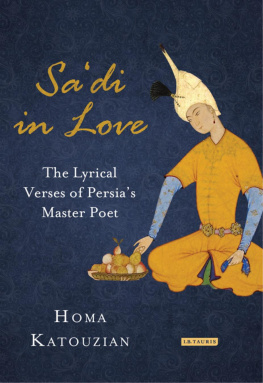
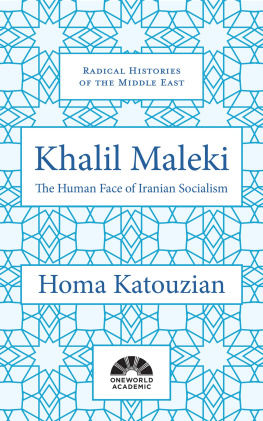
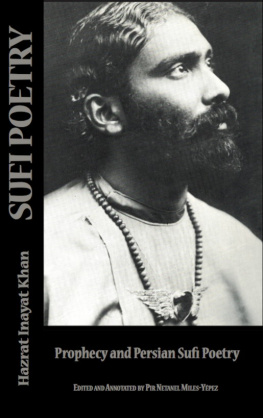

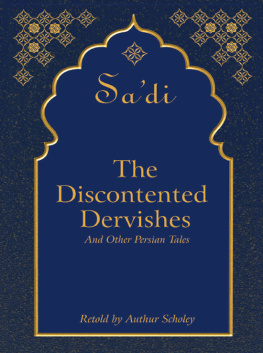
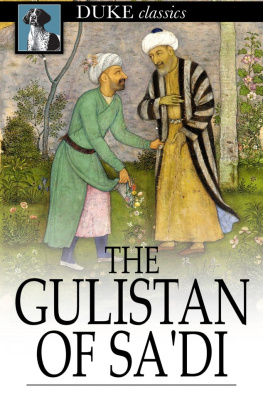
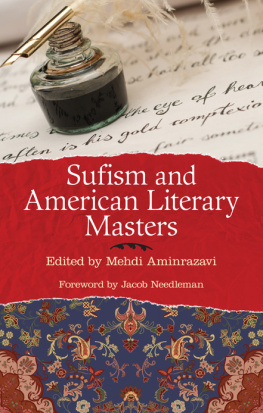
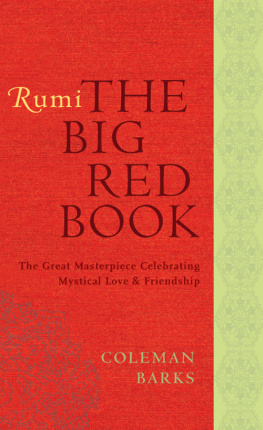
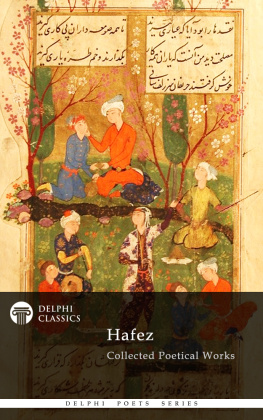
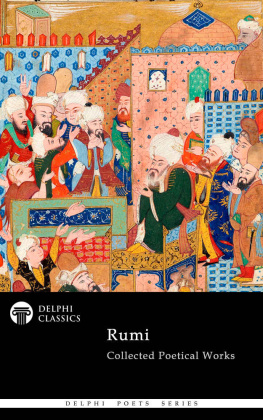
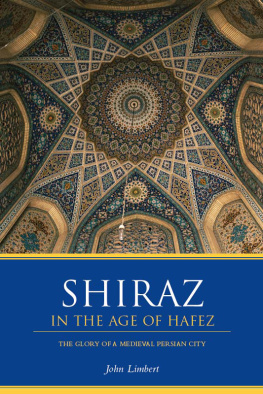
 In loving memory of my mother
In loving memory of my mother